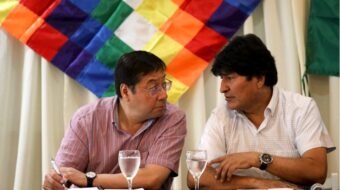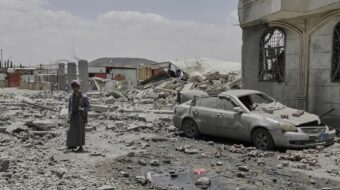The July 2 liberation of hostages held by the Revolutionary Armed Forces of Colombia (FARC) was welcomed by world leaders, ranging from U.S. officials and French President Nicolas Sarkozy to Venezuelan President Hugo Chavez, who earlier negotiated the release of six hostages held by FARC.
Freed were former Colombian presidential candidate Ingrid Betancourt, who is also a French citizen, three U.S. air espionage contractors and 11 Colombian soldiers and police.
While most media reports focused on Colombia’s military cunning in staging the rescue, the decline of the FARC and the cruelty of hostage taking, for Colombian President Alvaro Uribe the operation was a welcome and necessary public relations coup. Colombia’s Supreme Court ruled recently that Uribe’s bribery of a legislator in 2006 disqualified his present presidential term. He is counting on a referendum to legitimize his tenure, and is trying to seek reelection in 2010, a move that is unconstitutional. Uribe has been battling for his administration was tied to drug traffickers and paramilitaries.
While the rescue was met with jubilation, many say that to end Colombia’s 40-year civil war diplomacy and systemic solutions are needed. In the end, “rescues do not solve the Colombian conflict. Humanitarian agreements are needed,” said Yuri Tatiana Moncayo, whose brother has been held by the FARC for 11 years. Moncayo added: “If there is no justice, when inequalities exist and peasants are abused, there will never be peace.”
Rural poverty in Colombia approaches 70 percent. Almost half of all children grow up poor. United Nations figures place Colombia 11th in the world for inequalities. Some 15 million acres have been stolen, 4 million people displaced and over 15,000 people — many of them trade unionists — murdered or “disappeared.” Critics charge that U.S. military aid — which totals millions of dollars each year — fuels the civil war, violence and inequities.
“If we had a humanitarian agreement as we have been demanding, we would have had [our loved ones] home,” said the president of a group of families of soldiers and police held by the FARC, adding that the group is “seeking a formula to end this drama.”
Colombian Communist Party (CPC) General Secretary Jaime Caycedo said humanitarian accords are crucial to release of hundreds of prisoners on both sides of the armed conflict. The FARC holds additional hostages and FARC members and others considered political prisoners are held in Colombia’s jails. Carlos Lozano, editor of Voz, the weekly newspaper of the CPC, said that “conflict in Colombia must be resolved through peaceful means.”
However, the prospect for all prisoners to be freed through negotiations is clouded. Colombian Senator Gloria Inés Ramírez foresees continued government reliance upon military force. Defense Minister Juan Manuel Santos told reporters that hostages’ freedom will be obtained “by whatever means.”
Numerous questions have emerged challenging the official version of the rescue events. Reports indicate that U.S. military personnel were part of the maneuver despite claims that it was all Colombian. Reports that Israeli intelligence was also involved have also emerged.
Defense Minister Santos maintained that infiltrators fooled midlevel FARC leaders into gathering the prisoners in one location to be taken to a meeting with FARC head Alphonso Cano. Guards were told that two helicopters on an international mission would transport the prisoners. The white paint and Red Cross markings adorning the helicopters were possibly aimed at mimicking Venezuelan aircraft used earlier in hostage releases.
But lead foreign correspondent Pierre Bavaud of Swiss public radio reported $20 million had been drawn from a U.S. account to bribe a FARC guard.
Latin America analyst Pascual Serrano and others claim the Colombian military took over a negotiated release of the hostages that had been set for early July. They say Colombian authorities knew of FARC promises to release Betancourt and other hostages, and Swiss and French emissaries were reportedly conferring with FARC chiefs even as the military rescue unfolded.
Other negotiation efforts have been torpedoed in recent years by the Uribe administration. Hostage release talks in 2003 ended with the rendition of FARC envoy Simon Trinidad from Ecuador to the U.S. In 2004, French efforts for Betancourt’s release ended in the Colombian regime’s kidnapping of another FARC negotiator, Rodrigo Granda. Last year, the government interfered with efforts by Venezuela’s Chavez and Colombian Senator Cordoba to free hostages. The March 1 Colombian bomb attack in Ecuador that killed chief negotiator Raul Reyes aborted arrangements reached with French emissaries.
But the events of last week have put an international spotlight not only on the troubles of the Colombian people but also the tactics of the FARC. Calling current realities in Colombia “a very complex situation with only one way out: real peace,” Cuba’s former president, Fidel Castro, said he has “honestly and strongly” criticized the kidnapping and holding of prisoners in the jungle. He urged the FARC to “declare, by any means possible to the International Red Cross,” that they are willing to release remaining hostages without precondition.”
atwhit @ roadrunner.com









